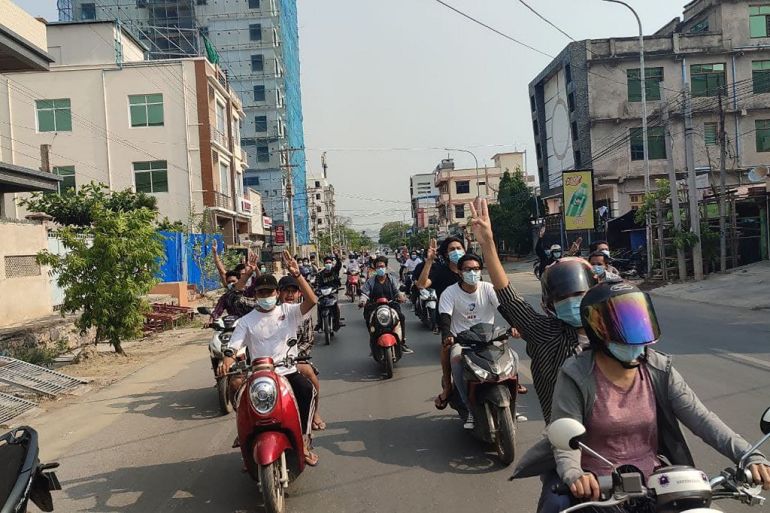Casualties reported as Myanmar forces fire at Mandalay protesters
Medical workers, who have been at the forefront of the campaign against the coup, lead protests on the third day of country’s New Year.

At least one person has been reported killed and several injured after Myanmar security forces opened fire on a pro-democracy protest by medical workers in the city of Mandalay, according to local media on Thursday, with reports of many young demonstrators arrested.
An image posted on social media showed a monk carrying a severely injured man, with two other people assisting him. The person later died, according to a social media post quoting the Mandalay-based Friday Times Journal.
Keep reading
list of 3 itemsMyanmar’s Aung San Suu Kyi slapped with new criminal charge
Myanmar has never been a nation. Could it become one now?
Several photos on social media also showed the military rounding up people on Thursday morning before they could join the protest in the country’s second-largest city.
Medical workers, some of whom have been at the forefront of the campaign against the coup, have gathered early in Mandalay but troops soon arrived to disperse them, opening fire and detaining some people, the Mizzima news agency added.
Mizzima said it did not have details of the number of casualties or arrests.
But among those who were reportedly nabbed by authorities were journalists identified as Ajax and Christopher from Myitkyina News Journal.
Ko Wai Moe Naing, an organiser of anti-military protests in the city of Monywa in Sagaing region was also detained on Thursday, according to the Civil Disobedience Movement (CDM).
Mandalay-based Friday Times Journal confirmed that this brother passed away. #WhatsHappeningInMyanmar #Apr15Coup #MilkTeaAlliance https://t.co/I5ZNN4Zvss
— Ro Nay San Lwin (@nslwin) April 15, 2021
Images were also posted of several damaged vehicles allegedly destroyed by security forces in Mandalay.
Opponents of the military’s February 1 coup that removed an elected government led by Nobel Peace Prize laureate Aung San Suu Kyi have kept up their campaign against the military this traditional New Year week with a series of actions and marches.
A spokesman for the military government could not be reached for comment by news agencies.
New Year protest
The coup has plunged Myanmar into crisis after 10 years of tentative steps towards democracy, with daily protests and campaigns of defiance, including strikes by workers in many sectors that have brought the economy to a standstill.
The five-day New Year holiday, known as Thingyan, began on Tuesday but pro-democracy activists cancelled the usual festivities to focus on their opposition to the generals who seized power.
The military says the demonstrations are dwindling but there were reports of flash protests in Sagaing Region as well as in Hpakant township in Kachin State and Kyondoe in Karen State.
In Phayuso township in Kayah State, hundreds of people were seen carrying anti-military government banners, defying warnings by security forces.
Before the latest security crackdown on Thursday in Mandalay, the activist group, Assistance Association for Political Prisoners, had already reported at least 715 protesters killed since the military seized power.
The United Nations human rights office warned on Tuesday that the military clampdown on the protests risked escalating into a civil war, such as Syria’s.
Flagging possible crimes against humanity, the High Commissioner for Human Rights Michelle Bachelet urged countries to take immediate action to push the military to stop its “campaign of repression and slaughter of its people”.
Protesters in Meikhtila held a “Thangyat Strike” on Thursday—the third day of the Thingyan New Year Water Festival. Thangyat is a traditional art form that fuses poetry, satire and music and is performed during Thingyan. Marchers incorporated the lyrics into their demonstrations. pic.twitter.com/SUEmUu9CUv
— Myanmar Now (@Myanmar_Now_Eng) April 15, 2021
“I fear the situation in Myanmar is heading towards a full-blown conflict,” Bachelet said in a statement.
“There are clear echoes of Syria in 2011,” she warned, referring to the start of a civil war that over the past 10 years has killed about 400,000 people and forced more than six million to flee the country.
The military government’s bloody crackdown has brought widespread international condemnation and calls for restraint – as well as sanctions from some countries on the Myanmar armed forces and their extensive business interests.
But diplomatic bickering has stalled concrete action, with the European Union’s top diplomat blaming Moscow and Beijing for blocking tougher measures, such as a United Nations arms embargo.